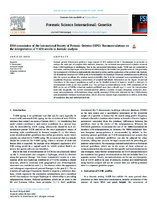| dc.contributor.author | D’Amato, Maria Eugenia | |
| dc.contributor.author | Roewer, Lutz | |
| dc.contributor.author | Andersen, Mikkel Meyer | |
| dc.date.accessioned | 2021-01-06T07:52:56Z | |
| dc.date.available | 2021-01-06T07:52:56Z | |
| dc.date.issued | 2020 | |
| dc.identifier.citation | D’Amato, M. E. et al. (2020). DNA commission of the international society of forensic genetics (IGSF): recommendations on the interpretation of y-str results in forensic analysis. Forensic Science International: Genetics, 48,102308 | en_US |
| dc.identifier.issn | 1872-4973 | |
| dc.identifier.uri | 10.1016/j.fsigen.2020.102308 | |
| dc.identifier.uri | http://hdl.handle.net/10566/5572 | |
| dc.description.abstract | Forensic genetic laboratories perform a large amount of STR analyses of the Y chromosome, in particular to analyze the male part of complex DNA mixtures. However, the statistical interpretation of evidence retrieved from Y-STR haplotypes is challenging. Due to the uni-parental inheritance mode, Y-STR loci are connected to each other and thus haplotypes show patterns of relationship on the familial and population level. This precludes the treatment of Y-STR loci as independently inherited variables and the application of the product rule. Instead, the dependency structure of Y-STRs needs to be included in the haplotype frequency estimation process affecting also the current paradigm of a random match probability that is in the autosomal case approximated by the population frequency assuming unrelatedness of sampled individuals. Information on the degree of paternal relatedness in the suspect population as well as on the familial network is however needed to interpret Y-chromosomal results in the best possible way. The previous recommendations of the DNA commission of the ISFG on the use of Y-STRs in forensic analysis published more than a decade ago [1] cover the interpretation issue only marginally. The current recommendations address a number of topics (frequency estimators, databases, metapopulations, LR formulation, triage, rapidly mutating Y-STRs) with relevance for the Y-STR statistics and recommend a decision-based procedure, which takes into account legal requirements as well as availability of population data and statistical methods. | en_US |
| dc.language.iso | en | en_US |
| dc.publisher | Elsevier | en_US |
| dc.subject | Evidential weight | en_US |
| dc.subject | Frequency estimation | en_US |
| dc.subject | Population data | en_US |
| dc.subject | Y chromosome | en_US |
| dc.subject | YHRD | en_US |
| dc.title | DNA commission of the international society of forensic genetics (IGSF): recommendations on the interpretation of y-str results in forensic analysis | en_US |
| dc.type | Article | en_US |

